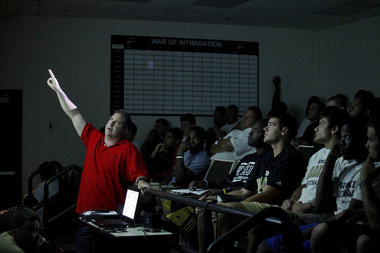Now that football season is upon us, let’s discuss the importance of watching film.
Watching film of practice or games is commonplace at most levels of football. Coaches and players crowd around a projector to dissect each step, each reaction, and each play to determine success. How did you do at your individual position? Collectively, how did all eleven players perform on that play?
Coaches and the best players love film. Coaches love to review each play and determine if their game-plan, if their coaching translated to the players on the field. Coaches also love watching film and saying things like “the eye in the sky never lies” or “what we see on film is either what we coach or what we allow.”
Cliché as they are, those statements are 100% true. If someone made a big play for the team, the players were coached right. If someone missed an assignment or committed a penalty, they players weren’t coached hard enough or didn’t clearly understand their expectations. Coaches and players are forced to take ownership when watching film. Good or bad – every move and result are there for all to observe. That is how coaches and players are held accountable. That is how football teams become better.
So now we have to ask the question: what if we watched film on your school?
—
Would school leadership feel comfortable that they either coached or allowed every action they saw on film? What is the game-plan for your school? Are teachers and students being coached according to it? How are teachers and students being held accountable to the expectations outlined in the game-plan?
This level of extreme ownership is required in order to be exceptional in any field.
Particularly in education, we tend to point at very real issues and use them as reasons why we aren’t seeing progress. Yet we know the strongest leaders and organizations in any sector of work have a mindset that ALL students can learn and ALL adults can support students in their learning. The adults in the school must create expectations, teach those expectations, and hold their peers and the students accountable to those expectations. Often, teachers and principals say things once and hope that it holds true for the school year. But to really become a habit, school leadership must create a game-plan, teach expectations, must watch film and adapt to support the learning in their building.
When we as adults and leaders take ownership for what we see in our schools and organizations, solutions become clear:
- The students aren’t “bad”. The adults haven’t clearly taught them the proper behavioral expectations of the school.
- The students are talking in the hallway because the adults aren’t following the appropriate steps of the school’s behavior system.
- The students are acting out in class because the teacher hasn’t created an engaging lesson.
- The students aren’t performing well on quarterly assessments because the adults haven’t properly assessed data and adapted their instruction throughout the quarter.
Of course, it’s human nature to get frustrated and expect that students (or adults) should naturally know how to perform in any classroom or organization. However, when we’re leading students and creating a unique culture, even the most specific detail must be taught, practiced and assessed – continually. What we see in our schools, we either teach or allow.
It’s never the kids. Once we as adults take ownership, watch the film, and adapt, anything is possible.
Action Steps
- Pick one system or routine you want to improve in your school
- Establish a game-plan and expectations to improve it
- Teach the expectations to your staff and students
- Watch the film, review with your team, adapt, and repeat

